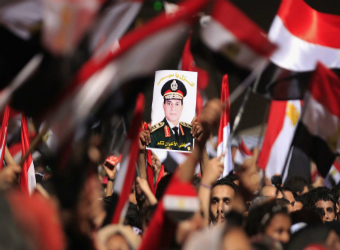Scarcely a month after the coup d’état that brought down President Mohamed Morsi and the Muslim Brotherhood, Egypt’s army, hailed as saviours by millions of citizens fearful of Islamism, seems to be rewriting the terms of transition to an inclusive democracy. After the rapture, the Tamarod (rebellion) movement that repossessed Tahrir Square should brace for a hard landing. Tamarod regrouped the vital forces that brought down Hosni Mubarak’s dictatorship in 2011, remobilising against the Brothers’ divisive drive to reshape Egypt in their own image and occupy its buckled institutions with loyal Islamists. But these rebels allied with supporters of the ancien régime they had dreamt of sweeping away.
The army, in the benign narrative of the past month’s turmoil, did its patriotic duty and merely delivered the coup de grâce on behalf of an adoring nation. Egypt would thereby get a second chance to relaunch the revolution. The generals, all starch and sharp creases, and their grasping incompetence during the first stage of the transition from the Mubarak order forgotten, would reboot Egypt.
Always a delusion, that vision was cut to pieces in Saturday’s dawn attack on a Cairo sit-in of Morsi loyalists, which human rights groups suggest was a massacre executed by security forces. After army chief Abdel Fattah al-Sisi called on Egyptians on Wednesday last week to take over the streets and give him a “mandate” to confront “violence and potential terrorism”, the scores killed became a chronicle of deaths foretold. Under the old, if implausible script, the army had suspended the constitution and set up a caretaker government to produce an inclusive constitution and a fair electoral law, after which there would be new parliamentary and presidential elections. Now, it seems, Gen Sisi has sensed greatness, giddied by the masses that came out to assist the Brotherhood’s political suicide.
The general’s picture is plastered all over Egypt, and the army, the country’s paramount institution, is swelled by a surge of popular support. Why would he not try to ride this populist wave and maybe, as siren voices in Cairo are starting to hint, even seek the presidency for himself? Even if he does not, the army is clearly determined to secure its power, privileges and prestige in the country’s political and economic affairs – just as it did not just under Mr Mubarak but with Mr Morsi.
The Islamist-inspired constitution that the Brotherhood and its Salafi allies rammed through in December not only enshrined but extended the powers of the military, part of the Morsi government’s misfired attempt to co-opt the “deep state” behind the Mubarak regime and the six decades of army-backed dictatorship that began with Gamal Abdel Nasser, the pan-Arab nationalist titan whose rhetoric Gen Sisi now dimly echoes.
Without Mr Morsi’s preternatural ability to unite his enemies it looks likely that the coalition of liberals and leftists, minorities and secular youth that marched against him will fragment, keeping the general and his military populism centre stage.
Look, for instance, at General Mohamed Ibrahim. He is, paradoxically, a holdover from the last Morsi cabinet but heads an interior ministry being alarmingly revitalised along Mubarak regime lines. On Sunday he claimed the armed forces have “popular support and a legal mandate” to lead Egypt into “a new dawn”. More substantively, Gen Ibrahim has resurrected the political and “religious” crime units of Amn al-Dawla or State Security – the most infamous of the old regime’s secret police agencies, with a vast army of political low-lifes and informers at its command. Disbanded in March 2011, its operatives are suspected by some to be behind several subsequent provocations adding to Egypt’s chronic instability – and now they are back. Is this the transition imagined by the liberals and the left – reconsecrating the security state?
Egypt’s secular forces are in danger of making one of the Brotherhood’s fundamental mistakes: relying on the army rather than their fellow citizens. They keep sloganeering that the army and the people are “one hand”. The security forces are meanwhile criminalising a big slice of society, by shooting Islamists, shutting their media and bringing fanciful charges against Mr Morsi – an elected president if one who failed serial democratic litmus tests – ranging from murder to espionage. If this continues, the generals will give a “martyrdom premium” to Islamists, rarely more than a quarter of the electorate, while secular forces with greater potential support are struggling to crystallise. Driving the Brotherhood underground, moreover, is a sure fire way of inciting the terrorism the army says it is fighting.
It might help to moderate the generals’ ambitions if the US made clear that its annual $1.3bn stipend for the army, sacrosanct since Egypt made peace with Israel in 1979, is now contingent on a transition to democracy that includes the now-demonised Islamists. Holding up the delivery of a few jets will not get their attention. They understand the difference between the pro-forma tut-tutting and the nudges and winks encouraging them to get a grip.
The Egypt that is reaching for the future has shown it can mobilise with extraordinary élan. It now needs to match its prowess in the streets by organising to win power at the ballot box, rather than rely on the pharaoh-makers in uniform. The military is not the gateway to a liberal future – and there is room in jail for all its opponents.
Source: The Financial Times



